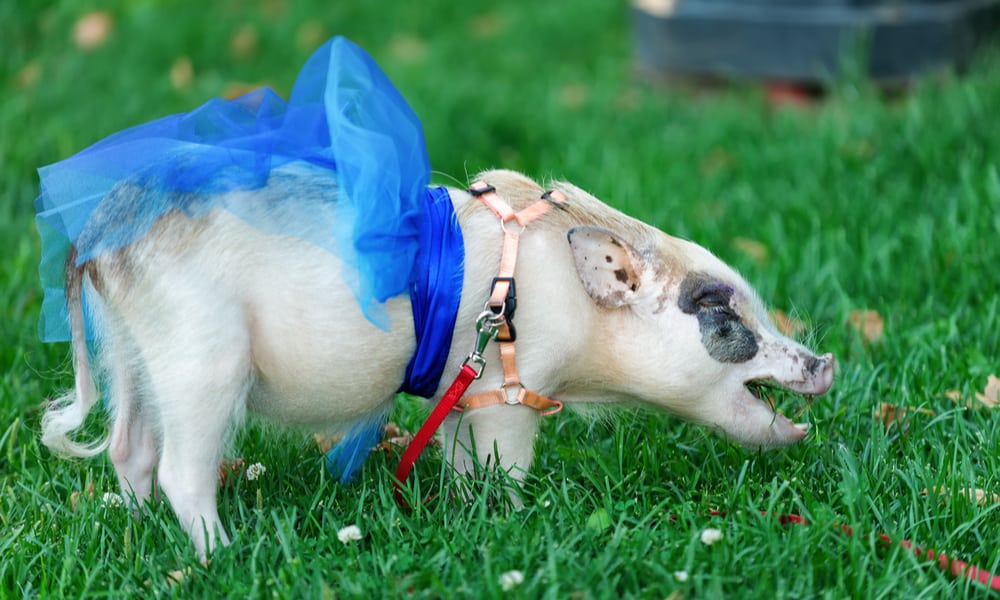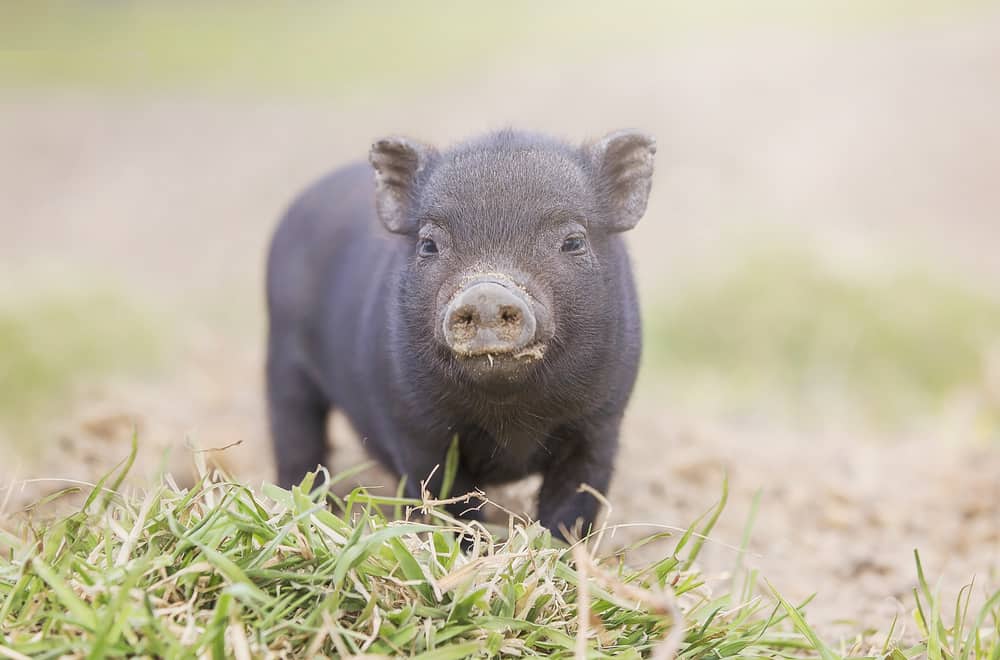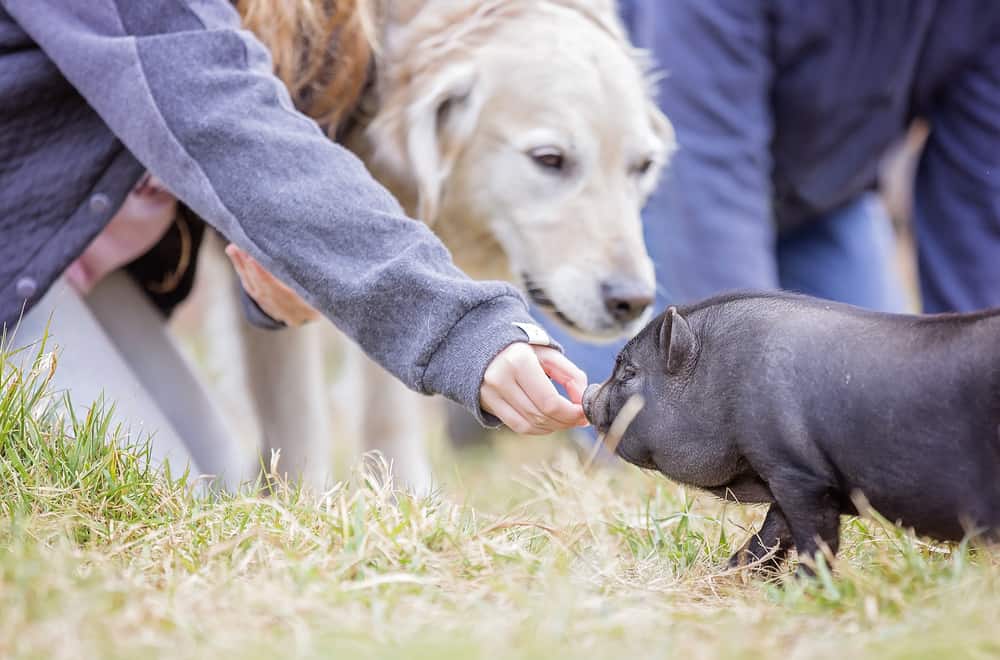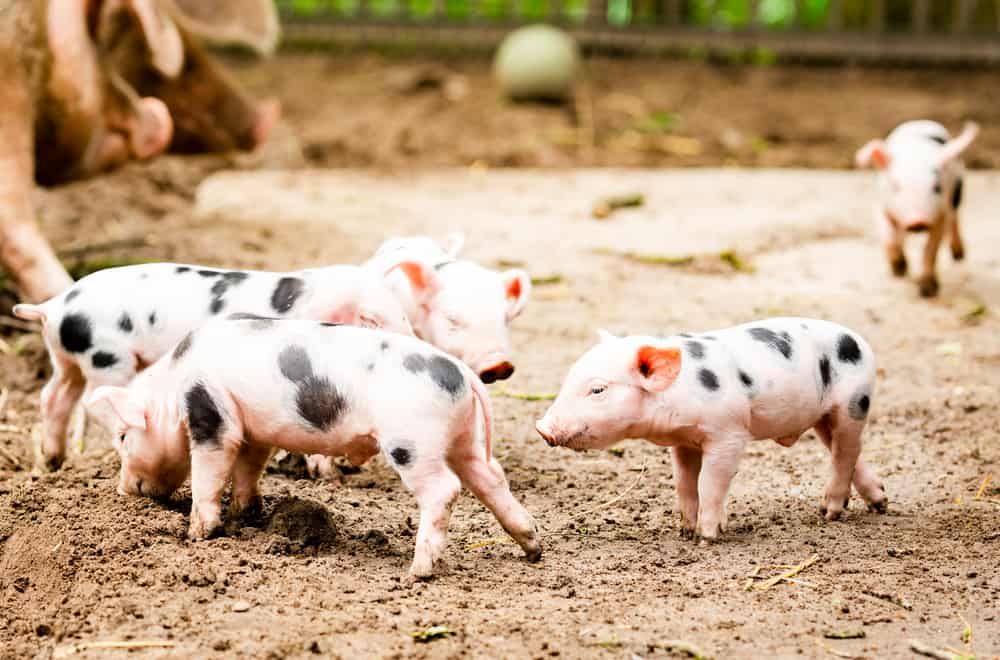Adding a pet to your family is, for sure, cute and a joyous thing to do. However, it comes with a lot of added responsibility.
Moreover, suppose you’re planning on adopting a pet like teacup pigs, which should be taken extra care of. In that case, you should know many of their behavior beforehand, such as their feeding habits.
While teacup pigs do eat almost everything they’re given, there are many recommendations and restrictions you need to follow if you want to raise them safe and healthy.
Luckily, in this post, we’ll discuss it all! So, what do teacup pigs eat? And, what we shouldn’t feed them? Read on to find out!
What Do Teacup Pigs Eat?
Teacup pigs are omnivorous animals, i.e., be it meat or leafy greens, they like to eat all that comes their way. However, while taking care of your mini pigs, you have to feed them with nutritious and safe food products. Below are some recommended food products that mini pigs enjoy eating.
1. Commercial mini pig pellets
There are many companies that sell nutritious mini pig chow. One must make sure that the pellets they’ve bought are for mini-pigs and not for farm pigs, as farm pigs’ pellets are specifically designed to fatten them, and we wouldn’t want that for our pet pigs.
On the other hand, teacup pigs’ pellets are formulated with the appropriate amount of protein, i.e., 12% – 18%, and have very little fat content. So, if fed in proper portions, these pellets don’t encourage obesity in teacup pigs.
Fortunately, different formulations depending upon the age of your teacup pigs are available in the market. Newborn piglets can be bottle-fed commercially available milk until they’re weaned after week 7.
Likewise, the diet requirement of an actively growing mini pig, i.e., 8 to 16 weeks of age, an adult mini pig, breeding, and a lactating mini pig, varies. So, the pellet bought should be appropriate for your teacup pigs’ age to make sure they’re getting a healthy diet.
2. Veggies and greens
Besides their regular commercial balanced diet, teacup pigs also should be fed roughages. You can simply feed them vegetables such as celery, cauliflower, radish, zucchinis, broccoli, peas, pumpkin, or other leafy greens.
However, you shouldn’t feed veggies such as cauliflower and broccoli in excess as they cause gas in teacup pigs. Likewise, it is best if you’d peel veggies such as zucchinis before feeding your pigs, as the outer layer of such veggies might contain residual fertilizers and pesticides.
You can also let your teacup pigs graze on fresh grass. Also, you can feed them hay at times to increase their dietary fiber.
Let these roughages constitute around 25% of your teacup pigs’ diet. Also, remember not to feed them starchy veggies such as potatoes in excess. So is the case for salty canned food; feeding too much of such an item to your mini pigs is a big no-no.
3. Treats
Every pet deserves a treat once in a while. There are plenty of treat options available for your teacup pigs. You can either surprise them with commercially available treats or treat them with fruits, unsalted nuts, and plain popcorns.
Grains devoid of salt and butter also make a great treat for your mini pigs. Likewise, unsalted cheerios, or teacup pigs-safe cereal such as cheerios, can also be fed to your pet pigs as treats.
4. Water
Mini pigs drink plenty of water. Also, as pigs do not sweat like humans to cool the body down, they need water for the purpose. So, water should be made readily available to your teacup pigs.
If you have many pigs, make sure you place water bowls at more than one place, such that they shouldn’t fight each other for water. Also, make sure you replace the water as soon as it becomes dirty.
Also, they are notorious for flipping their water bowls. So, to be on the safe side, you should consider purchasing heavy water bowls. Or else, you can just DIY a solid bowl for your water bowl flippers.
Moreover, if your teacup pigs are refusing to drink enough water, you can flavor the water using natural products. As these pets shouldn’t be fed too much sugar, be wary of artificial sweeteners.
And, if they’re drinking too much water, it might be an indication of an underlying health complication.
How Often Should You Feed Your Teacup Pigs?
While wild pigs eat plenty of small meals throughout the day, the recommended number of meals per day for teacup pigs is twice a day, once in the morning and the other in the evening.
These are the major meals of their day when you feed them the commercially available nutritionally balanced pellets.
It is absolutely okay to feed your pigs some roughages in between the meals. Or, you can supplement their big meals with veggies as well. Also, small bites of treats such as fruits or unsalted nuts or popcorns once or twice a day don’t hurt.
Mini pigs are always known to finish their meal. So, if you’re finding it difficult to feed your pet pigs fully, there might be some underlying health condition that is giving your pet a hard time eating.
How Much Should You Feed Your Teacup Pigs?
Mini pigs are extremely likely to get obese. These animals do not have a thalamus to alert them when they’re full. Instead, they keep on eating even if they’re not hungry anymore. So, it is essential that you provide them with strict healthy portions and never let them binge eat.
Obesity in mini pigs is not just about the body size; it comes with a lot of big complications. It is also known to cause hearing and seeing problems in mini pigs. Also, obese pigs are known to be tired easily, develop joint problems, and live a lot lesser than fit pigs.
So, what amount is the perfect amount to feed teacup pigs? Many commercial pellet packaging comes with a chart where you can observe the body sizes of pigs and find out the appropriate pellet portion for them accordingly.
However, the general rule is that mini pigs should be fed only 2% of their body weight per day. This amount should be split between two big meals of the day.
For instance, if your mini pig weighs 10 lbs, you should feed them with ½ cup of pellets per day, which you can divide as ¼ cup in the morning and the remaining ¼ in the evening.
Though the pellet amount might not look sufficient, it is perfectly formulated to suffice your teacup pigs. Many owners find this amount to be too little. So, instead of following the guidelines, they overfeed their pigs without proper calculation, which might cause them to be obese.
Likewise, underfeeding your mini pigs is equally dangerous. If you see your pigs’ hips, bones and spines, that’s an indication that you aren’t feeding your pet well. Symptoms such as lethargy, bad skin and eyes often accompany malnutrition and illness. So, make sure your pig isn’t displaying any such signs.
What Not To Feed Teacup Pigs?
Now that we’ve discussed what your teacup pigs like to eat let’s discuss some food items that aren’t considered safe for your mini pigs.
1. Breakfast Cereal
Wheat brans are high in phosphorus. Feeding on such cereals too much can cause an imbalance in teacup pigs’ calcium and phosphorus levels. Also, eating too many cereals that have high sodium content can also result in a condition called ‘salt poisoning’.
2. Un-pitted stone fruits and unshelled nuts
Stone fruits such as nectarines and peaches should not be fed to your mini pigs unless you remove the pits, as pits can end up lodging in the intestine. Likewise, shells of nuts can pierce or scratch their mouth or oesophageal lining.
Also, stony pits of apricots and peaches as well as apple and pear seeds, have a compound named Amygdalin. This substance releases Hydrogen Cyanide causing discomfort in your mini pigs’ stomach.
3. Cat or dog food
Cat and dog foods are high in protein, which isn’t a healthy food for teacup pigs. However, your mini pigs are smart enough to lurk into cabinets and eat what’s not meant for them. So, ensure that you’ve pig-proofed your kitchen cabinets.
4. Empty calorie food
Empty calorie food, besides giving temporary hunger satisfaction, does no good to any animals. These foods are high in calories and have minimal nutritional benefits, such as fries, ice cream, jellies, donuts, and other sugary food. So, these food items should not be fed to your teacup pigs.
However, you can entice them at times using these foods, for example, while feeding them medications.
Summary
We hope to have given you every important piece of information on teacup pigs’ eating behavior. If you’ve adopted one already, we believe you’ll raise them extremely healthy and happy. And, if you haven’t already, what are you waiting for? Go, be a responsible and proud mini pig parent!



